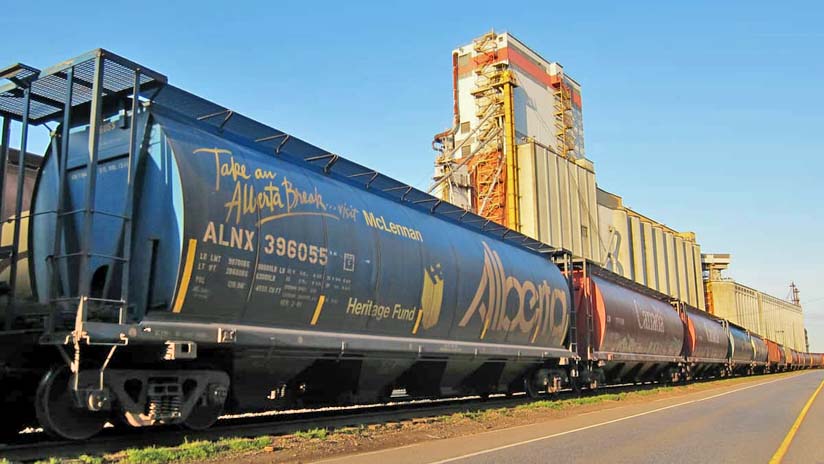
Canada - Canadian grain groups are taking a fresh look at pressing government officials to enact legislation that would address how the
country can continue shipping grain and grain products in the event of a strike or other work stoppage.
One option the groups have mentioned is finding a legislator to introduce a bill declaring rail an essential service.
The Public Service Labor Relations Act defines an essential service as "a service, facility, or activity, of the Government that is, or will be, at any
time, necessary for the safety or security of the public or a segment of the public."
 The Act states
"safety or security", not profit.
The Act states
"safety or security", not profit.
"The significance of declaring rail as an essential service is that strikes or lockouts would become unlawful. They would have to resolve their collective
bargaining agreement through binding arbitration instead, but goods would continue to flow," said Wade Sobkowich, executive director for the Western Grain
Elevator Association (WGEA).
Grain groups had considered pressing for that option in the past.
The November strike at Canadian National (CN) revived the discussion.
Members of the Teamsters Canada Rail Conference (TCRC), including CN conductors, trains persons, and yard workers, went on strike 19 Nov 2019.
The strike ended on 26 Nov 2019 but it hit supply chains across Canada, bringing trade disruptions, goods shortages, and layoffs.
Declaring rail an essential service was one of the items that WGEA lobbied for during the 2014 and 2015 revision of the Canada Transportation Act, Sobkowich
said.
That revision eventually became the Transportation Modernization Act, and it addresses grain-related issues such as maximum revenue entitlement and incentives
to the railways to invest in capital infrastructure for the western grain rail network.
With the May 2018 strike at Canadian Pacific (CP) and the recent CN strike, "there is a more focused effort to include rail as an essential service in our
list of asks of the federal government, not only by the WGEA but by other sectors and producer groups," Sobkowich said.
Grain associations say they are held hostage by a "dual monopoly" consisting of the railways and the unions.
If the union strikes, many have limited options, and as a result, they can end up slowing production if they run out of storage.
They can also run up costs resulting from vessel demurrage charges, contract extension penalties, contract defaults, or lost sales.
Although the union and Canadian National (CN) resolved the strike in eight days, stake holders, including the grain groups, said it would take weeks for the
supply chain to return to normal.
"Any pause in service almost immediately reverberates throughout our supply chain," said Chris Vervaet, executive director for the Canadian Oilseed
Processors Association, a group that represents producers who make canola oil and canola meal.
The Grain Growers of Canada is still weighing its options, including whether to join the call asking to declare rail as essential service.
But "whatever approach we take is going to be one that ensures that our sector will be offered some form of reassurance that we will never see an
interruption in rail service," said Erin Gowriluk, executive director.
"Our sector faces, collectively, this country faces, fairly regular threats with respect to strikes, whether that is CP or CN. Sometimes it feels like
once or twice a year. We recognize as we said during the strike that the ability to negotiate, that's not something that we want to interfere with. But what we
do need is some reassurance that while those negotiations are ongoing, that rail service continues and that the Canadian economy cannot be used as leverage or
cannot be held hostage," Gowriluk said.
Joanna Marsh.
provisions in Section 29 of the Canadian
Copyright Modernization Act.

